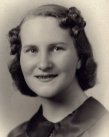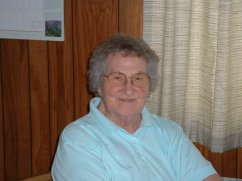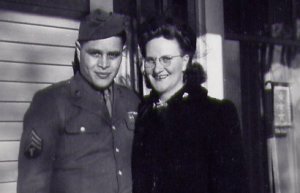| Norma was 20 years old in 1941, and when the news about the attack on Pearl Harbor came over the radio, she was at her family's Spring Valley home with her cousins having a good time, singing and visiting. At first, the news came as a shock, and really didn't sink in until later. Not until the draft was initiated in 1941, and the time went on did Norma, who was worried about her good friend Dick Schirmer (already in the Army) and her draft age cousins, did she realize what was happening.
|
| Norma had been working for the Interstate Telephone Company in Newport as a switchboard operator, and was frozen to her job when the war started, as communications was classified as essential to the war effort. Her wages started at 19 ¼ cents an hour in 1940, but by 1942 was earning 19 ½ cents an hour. Shifts would be 8 hours for the day shift, 6 hours for the relief split shift, and 10 hours for the night shift. I usually worked the night shift (10 p.m. to 8 a.m.) and would sleep in the office on a cot that we had made up. The day shift was the best one to have though. It wasn't always the same shift, the shifts would change daily, but I worked the night shift steady. While running the switchboard, she would also have to keep a record of who had called. We were sworn to secrecy while we worked in the telephone office, in fact, we had to sign a paper to say we wouldn't talk.
|
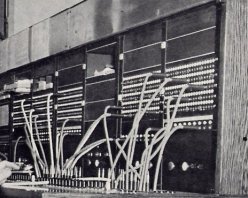 |
Telephone Switchboard
Courtesy Pend Oreille County Historical Museum |
| In the summer of 1942, she transferred to Athol to work in the main telephone office while Farragut Naval Station was being built. The main office was actually in a small house, where she and friend Dorothy Small were the day operators. The switchboard was in the living room, and they would have to learn new circuts everyday because of the daily addition of new lines, and how fast Farragut and Athol were growing.
|
| In September 1942 Norma went to Spokane for college, but continued to work for Interstate Telephone at Postal Telegraph in the Davenport Hotel. The Postal Telegraph office was just to the left inside the Sprague entrance main door. I had to learn to teletype, but working here was a lot of fun. I got to see a lot of different people, many soldiers and sailors, especially fun was talking to the Australian soldiers that came in. The Davenport was a very busy place, there were people constantly coming and going. One time Jerry Kalona, Jack Benny, and Fred Allen came in right across the hall and all of their luggage filled the entryway of the Davenport, they were the most famous people I saw. The servicemen (mainly officers) would stop and visit. On the short breaks that I got I would go to either the coffeeshop in the Davenport or go eat a sandwich at a café on Riverside.
|
| While working at Postal Telegraph, Norma was also attending classes at Whitworth College. I went in and signed up for the classes I wanted, paid $78 for all three, and attended for almost two quarters. I didn't apply at all, but since I got married at the end of the second quarter and left school, I only received credits for the first quarter. I lived with a family on the north side of town, took the bus downtown to work, and the bus as far as Francis and had to walk the rest of the way out to Whitworth (on Hawthorne) which was a couple of miles everyday. I would have to make sure I was off work by 11:00 p.m., as bus service ended at 11:00 p.m.
|
| I only worked at Postal Telegraph until February 1943 when my new husband wanted me back in Newport because he didn't trust the other dogfaces. So I quit school and went back to work in Newport at the telephone office, until the fall of 1944. Norma wanted to leave Interstate Telephone and go to work for Mountain States Electric, but the telephone refused to release her. She decided to quit, and instead went to work for Kimmel's Drug Store in Newport as a clerk until February 1945 when Dick returned from Alaska. I learned how to run the soda fountain, worked as a clerk, and met a lot of people. It was really neat to put faces with the voices that I had heard for so many years when I worked on the switchboard.
|
| I had wanted to go to work at the shipyards in Bremerton at the beginning of the war, but because I was born in Canada, I didn't have a birth certificate, therefore couldn't go through the civil service to get the job. By the time my parents and I went through the application process for my brother Wally and I to get our birth certificates, it was too late to apply and besides I had forgotton about it.
|
| It wasn't real different. I got used to having him around on his furloughs, and then he would leave and things would go back to the way they were before he had came home. I did worry about him though, even before we were married because we had been friends for so long. It was hard though because I really never knew where he was all the time. When he came down in 1944, they had to drop depth charges on a Japanese sub, but it didn't really hit me until later that the Japanese were that close to where he was. |
| We had dated on and off since Junior year, he was usually gone summers, working in California and home during the winter. We wrote letters back and forth, and in July 1941 he told me he was going overseas. He was stationed at Fort Lewis near Seattle before he went to Alaska. His sister Ann and her husband Everett and I went to see him, and he went AWOL to go to Ocean Shores with us to have a picnic. When we brought him back to base, he told the guards that he had been out working on a truck, and since he was a mechanic, they believed him so he didn't get in trouble. |
| After Norma and Dick were married, she saved her money and with $25 dollars she borrowed from the bank, was able to buy their first house and lot for $350, a home on Scott Avenue, that is still standing to this day. |
| At Christmas in 1943 Dick was able to come home for 30 days, but after that was gone for 13 months. In February or March 1945 Norma went with Dick to Santa Barbara, California for his R & R and debriefing. Santa Barbara was fun, he and the other guys would attend school during the morning and we could see the sights the rest of the day. We stayed in a posh hotel because that is what they put the servicemen in. |
| He was then stationed in Portland as a MP on the streets of downtown Portland, and I worked at Woolworth's in the household goods department for two months. When Dick was transferred to MP duty on the Empire Builder I went back to Newport and set up house. |
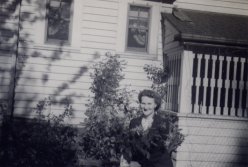 |
| Norma in Portland, 1945 |
| Dick had the Portland to Missoula route on the Empire Builder, and would be able to stop in Newport on his way through. We (my sisters and every once in awhile the Baptist minister's wife, in all 4 or 5 women) would meet him at the train depot, give him hugs and kisses and send him on his way. The other guys on the train were jealous because they couldn't leave, and this MP had 4 or 5 women hugging and kissing him. We would go to Spokane, pick him up and bring him home for the evening, then bring him back to the train in the morning, sometimes he would have more than one day off sometimes two. He was the envy of all the guys! |
| Coffee and shoes. I really liked my coffee, so having a limited amount was a pain, I would trade stamps so I could get more coffee stamps. The shoe ration was also a pain because I had passion for shoes, but I had 45 pairs of shoes throughout the war. Because there was no rubber for soles, and there was very little leather for the uppers, my shoes often had wooden or synthetic soles, and synthetic uppers. I even had some that had wooden dowels on the sole. |
| Since I worked at the telephone office, I was always out in the public eye, and had to dress up, in fact whenever we went anywhere, especially Spokane we had to dress up with our high heels, hat, and gloves. I had to wear rayon stockings when I worked or when anywhere, because we couldn't get silk or nylon. The rayon ones were also rationed, so we had to take special care of them. They were awful because they would snag, and then a big hole would be ripped in them. The silk stockings that we had before they were unavailable ran easy, they were expensive too, $1 a pair before they were unavailable. The silk stockings had the seam up the back, and you were constantly fixing them to keep the seam straight. I only tried painting my legs once, but it ended up blotchy, so I didn't do it again. |
| Meat was too expensive, so I ate a lot of chicken and rabbit, got pork from my folks who had pigs, ate soup, and also ate a lot of salmon or fish, but of course it was all canned, and subject to ration stamps. Gas was not a problem for me, because I walked everywhere, took the bus, or rode the train. I didn't use much sugar, so I gave my stamps to Mother because she canned. We even collected and turned in kitchen grease for the war effort, so it could be made into gunpowder, and collected and turned in scrap iron too, all for the war effort as part of our patriotic duty. |
